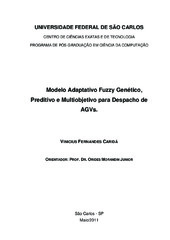Modelo adaptativo fuzzy genético, preditivo e multiobjetivo para despacho de AGVs
Abstract
In recent years, most companies apply techniques of industrial automation with the goal of increasing its efficiency. Increasingly Automated Guided Vehicles (AGVs) are used to transport work in factories and warehouses. The management of these AGV is the key to an efficient transport system. One of the main problems encountered in the management of AGV is the dispatching decision. This work proposes a method of dispatching of AGV with the ability to optimize the performance of flexible manufacturing systems (FMS) in real time. In the dispatching deciding can be chosen to optimize two objectives: makespan or tardiness. When the goal is to optimize the makespan are evaluated variables: distance, number of nodes, the input buffer and output buffer of the workstation. When the goal is to optimize the tardiness are evaluated variables: distance, number of nodes, task chaining, date of delivery. In both cases are also considered the time of the AGVs and the processing times of the workstations, so you can anticipate some decision-making. To perform the tests we used the softwares: Matlab, CPNtools and Automod, which allow simulations of how the method works dispatching AGVs before the method is implemented in factories. Based on the tests, we analyzed the improvement in makespan and tardiness compared to other studies, but also the flexibility of the method in which it is possible to exchange goals in operating time.
